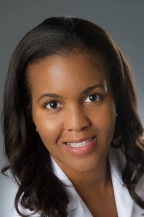
Dr. Adrienne Phillips
From a very early age, Dr. Adrienne Phillips — a medical oncologist and hematologist at Weill Cornell Medicine — knew she wanted to be a physician. Her grandfather emigrated to the US from Barbados to attend medical school and pursue a career in medicine. Her grandmother was a nurse and hospital superintendent, and both her parents worked as physicians.
“I remember shadowing my mom in the hospital. As a teenager, I worked in her office. I would even go to medical conferences with them,” Dr. Phillips reminisces. “My parents’ community of medical professionals helped raise me.”
Being surrounded by doctors had a deep influence on Dr. Phillips, particularly seeing minority women succeed in leadership roles in the medical field. Dr. Phillips’s mother is an oncologist and was president of the American Medical Women’s Association of New Jersey. Her grandmother was a nurse and the first superintendent of Provident Hospital in Baltimore, a hospital established to care for African-American patients and train African-American physicians and nurses.
“This devotion to both their profession and community inspires me to continue my family’s legacy,” explains Dr. Phillips. It’s safe to say that medicine is in her blood.
Having decided early on to pursue medicine, Dr. Phillips applied and was accepted to Brown University’s combined undergraduate and medical school program. “There were eight other minority women in this program. We were a very tight-knit group. We still are!” She smiles and recounts, “We helped each other through all the challenges along the way.”
Dr. Phillips went on to do her residency at Columbia University Medical Center where she was part of a committee for minority residents that helped her better understand the significance of the networks she had been a part of all her life. “I realized just how critical it was to support each other through the program,” she explains. “We had a lot of fun together, as well as helped each other.”
Now a medical oncologist and hematologist, as well as an assistant professor of medicine at Weill Cornell Medicine, Dr. Phillips continues to build and sustain a network of physicians for mutual support. “I am fortunate,” she explains, “to be a part of a strong group of minority women who nurture and support one another in our careers. We are a family.”
Her work — which includes caring for patients, researching to advance the field, and teaching young physicians — is energized by her circle of female and minority colleagues. She cites numerous mentors, including Dr. Susana Rita Morales (Vice Chair for Diversity and Co-Director, Center for Multicultural and Minority Health) and Dr. Linnie Maria Golightly (Associate Dean of Diversity), as having helped her succeed as a physician.
Her professional support network has been instrumental in helping her contribute to Weill Cornell Medicine’s missions of supporting diverse physicians and staff, as well as delivering the highest-quality care to underserved patient populations. Believing that these missions are intrinsically linked, Dr. Phillips is devoted to both.
Read about Dr. Phillips’s research and patient care.
Dr. Phillips strives to help other female and minority physicians by offering what has helped her so much: mentorship and camaraderie. She hopes to see more young people of color consider and pursue careers in medicine. Without a doubt, the path to these careers is long; everyone needs help to get started and more help along the way. Dr. Phillips makes a notable effort to connect with young people, medical students, and physicians to offer her support.
In 2011, she was recognized for her efforts doing just this when she received the prestigious Harold Amos Medical Faculty Development Award for encouraging and supporting medical practitioners from historically disadvantaged backgrounds.
“Unfortunately,” says Dr. Phillips, “the number of minority physicians has not increased substantially since my time in college and medical school. More efforts are needed to mentor and support young people. We need to be reaching out to future generations about academic medicine, STEM, and scientific research.” Dr. Phillips, along with many of her colleagues and friends, are reaching out to minorities at a younger age — and then offering support as they progress in their careers.
Among Dr. Phillips’s many achievements, one stands out: her continuing her family’s legacy as successful medical professionals devoted to their community.
Learn more about the Office of Diversity and Inclusion’s many efforts to support diverse students, staff, and patients at Weill Cornell Medicine.